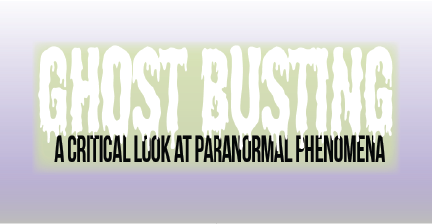Ghost busting: A critical look at paranormal phenomena
October 26, 2017

Ghosts and hauntings are two of the most enigmatic and unfathomable concepts in the world. There’s no way of knowing whether a paranormal experience is real, or where it’s coming from, yet many people have stories of their personal experiences with the otherworldly — some right here on campus. While individuals often either blindly believe or blindly dismiss the presence of ghosts, Dr. Rich Robbins, Associate Dean of Arts and Sciences for Junior and Senior Students, argues that more thought should be dedicated to contemplating their existence. He emphasized the importance of thinking critically about these phenomena in his talk “Ghosts and Hauntings: You Decide,” held on Oct. 24 in the Trout Auditorium. Robbins outlined various paranormal phenomena, pinpointed places on campus that are rumored to be haunted, and detailed why it’s so common to believe in ghosts.
Robbins’s insight into paranormal activity
Robbins has extensive knowledge on ghosts that is derived from both personal and researched experiences. Robbins grew up in Bloomsburg, Pa. in a very old house that had a reputation for being haunted.
“Very weird stuff would happen. Things would always move and my family members said they saw things,” Robbins said. This early exposure to possible paranormal activity sparked Robbins’ interest in ghosts and hauntings, and led him to pursue a career in these phenomena.
Robbins wanted to be a parapsychologist with a focus on ghosts and hauntings. He experienced minor setbacks, however, due to the lack of education in these fields. According to Robbins, colleges believed that the study of parapsychology and spirits wasn’t very legitimate. Instead, Robbins got his masters in experimental psychology and received a Ph.D in social psychology. He continued to read literature on topics of paranormal activity and eventually became certified in parapsychology.
Robbins has been on multiple ghost huntings around the country and has been contacted by multiple television networks requesting his expertise on the paranormal. Robbins’ main objective in studying parapsychology is to think critically about ghosts and hauntings phenomena and how it affects people.
“I am agnostic when it comes to ghosts. I need to experience it myself and have experts rule out every other possibility for me to believe,” Robbins said.
Background and details of ‘Ghosts and Hauntings’ talk
On Tuesday, October 24, exactly a week before Halloween, Robbins held his annual “Ghosts and Hauntings: You Decide” talk in Trout Auditorium. Robbins has been giving this presentation for 10 years at the University, and has also shared the lecture with local community centers. According to Robbins, the talk changes every few years, as it is influenced by what he comes across in his continual research.
Robbins created a spooky environment in Trout, complete with dark lighting and horror movie music. The presentation’s content, however, was much more analytical and scientific than scary. Robbins began with a history of the first reported ghost stories, discussing how they stem from animism (the belief that natural objects and phenomena have souls) and ancestral worship. He analyzed religion and how it influences individuals’ belief in ghosts and hauntings.
Robbins debunked many of the Hollywood portrayals of ghosts, but showed a series of famous pictures featuring supernatural-like images that have not yet been proven fake. He detailed multiple common phenomena including shadow people, hauntings, poltergeist, the disappearing object phenomenon, and the electronic voice phenomenon. Robbins then described various theories that explain these phenomena and the presence of ghosts.
Paranormal ‘hot spots’ on campus
There are many places on or near campus that are rumored to be haunted. One of the buildings that carries this label is Hunt Hall, which is commonly said to be haunted by a dead woman named Angela. According to Robbins, some of the University maintenance staff have reported strange activity in Hunt during the summer months when no one occupies the rooms. Female students also claim to experience paranormal activity in the sorority-housed building.
“I’ve sort of always been able to sense energies. I can’t see ghosts per se, but when I walk into a new space, I get a vibe of it and can sense if there’s any ‘energy’ present,” Katherine Tucker ’18 said. “After I lived in Hunt Hall last year, I became convinced the building was haunted. Things would move inexplicably, and lights would turn on and off for no reason.”
Additionally, Roberts Hall is allegedly haunted. Robbins contended that paranormal activity can spike up after renovations, so Roberts Hall may be even more susceptible to hauntings after its reconstruction.
“I think Bucknell, being as old as it is and situated close to a large cemetery, makes a prime location for energy to linger,” Tucker said.
Why do we believe in ghosts?
Robbins attributed widespread belief in ghosts to a “human need to explain things we don’t understand”. People see and experience things that they can’t comprehend, and cope with that by giving it a label. Robbins also noted that a person’s brain physiology can affect their perceptions of ghosts based on abnormal activity in the temporal lobes. In regards to seeing ghosts in pictures, people have a tendency to construct faces and familiar images out of nothing. According to Robbins, a person’s supposed experiences with ghosts can come from expectation. There are many factors that lead people to believe in ghosts, but according to Robbins, there’s no way of knowing. “Not having an explanation doesn’t mean it’s paranormal,” Robbins contended.
Haunted Spots Nearby:
Hunt Hall
Roberts Hall
Pineapple Inn
Packwood House Museum
Milton Public Library






















Johnson • Jun 7, 2019 at 2:29 am
Robbins did not explain situations where people are actually attacked and have visible scratches or wounds.